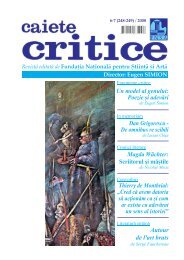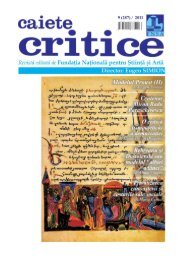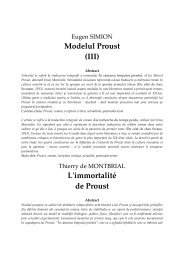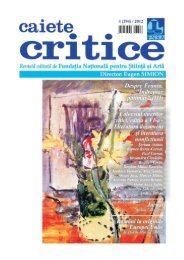Tot despre modelul grec în cultura română: parabole ... - Caiete Critice
Tot despre modelul grec în cultura română: parabole ... - Caiete Critice
Tot despre modelul grec în cultura română: parabole ... - Caiete Critice
You also want an ePaper? Increase the reach of your titles
YUMPU automatically turns print PDFs into web optimized ePapers that Google loves.
Mihai A.<br />
STROE<br />
Romanticism<br />
and Chaos<br />
Theory<br />
Abstract<br />
Chaos theory and the sciences of complexity<br />
are a relatively new field in modern science. In<br />
the present paper, starting from a definition of<br />
chaos theory, such as can be derived mainly<br />
from Ilya Prigogine's works, we undertake to<br />
explain the relevance of this new paradigm in<br />
science for a modern understanding and<br />
revaluation of romanticism .<br />
Keywords: chaos, complexity, evolution,<br />
bifurcation epoch, increase of freedom, orderdisorder,<br />
chaotic attractor, punctual/periodic<br />
attractor, stasis-kinesis, literature and science<br />
Chaos theory and the sciences of complexity<br />
are singularly relevant for the science<br />
of archetypes, which in the near future<br />
may constitute “integralogy”, a complete<br />
science of man. In this respect, Ilya<br />
Prigogine’s works have laid an important<br />
experimental and conceptual brick at the<br />
foundation of chaos theory – in this sense,<br />
Prigogine’s discovery of the so-called selforganisation<br />
of physical matter, with its<br />
resultant science, is relevant for the modern<br />
study of romanticism, as we propose to<br />
demonstrate in the present paper.<br />
Henry H. H. Remak suggested the following<br />
definition of romanticism which is<br />
connected to what chaos theory asserts:<br />
“romanticism is the attempt to heal the<br />
break in the universe, it is the painful<br />
awareness of dualism coupled with the<br />
urge to resolve it in organic monism, it is the<br />
confrontation with chaos followed by the<br />
will to reintegrate it into the order of the<br />
cosmos, it is the desire to reconcile a pair of<br />
opposites, to have synthesis follow antithesis”<br />
1 .<br />
An analysis of the romantic phenomenon<br />
from the perspective of chaos theory seems<br />
therefore fully justified.<br />
According to Ilya Prigogine, one of the<br />
main heralds of chaos theory, in dissipative<br />
systems there are two types of behaviour,<br />
which are relevant for chaos theory:<br />
1) close to equilibrium, therefore close to<br />
reaching stable order, systemic order<br />
tends to decrease, so the system tends<br />
towards disorder;<br />
2) far from equilibrium, the extant order<br />
can be maintained and new structures<br />
can be formed which are defined by a<br />
more elaborate order: in other words,<br />
the dissipative complex systems can<br />
go, when far from equilibrium,<br />
through irreversible processes in<br />
which the entropy or the degree of<br />
disorder tends to decrease (contrary<br />
to the principles of classical thermodynamics),<br />
the result being the formation<br />
of more complex structures.<br />
This is the so-called “universal criterion<br />
of evolution” which P. Glansdorff and Ilya<br />
Prigogine announced in Physica, 20, 773, in<br />
1954; it most likely has a high degree of<br />
ontic validity 2 .<br />
This universal criterion of evolution<br />
(according to which reality forms an oscillating<br />
system, that successively goes<br />
towards ever more elaborate, more complex<br />
orders; this idea drew the scientists’ attention<br />
to the concept of complexity and science<br />
of complexity) seems to have been<br />
intuited (at least in its spirit), long time ago,<br />
by George Santayana (in the latter’s The Life<br />
of the Reason or the Phases of Human Progress,<br />
1905-1906) as founding the cognitive life of<br />
1 Henry H. H. Remak, “A Key to West European Romanticism?”, 1968, p. 44.<br />
2 Amelia Dragotã Chirca, Mihai ªtefan Chirca, Premiile Nobel, Fizicã Chimie Medicinã, 1901-2002, 2002, p.<br />
563.<br />
51







